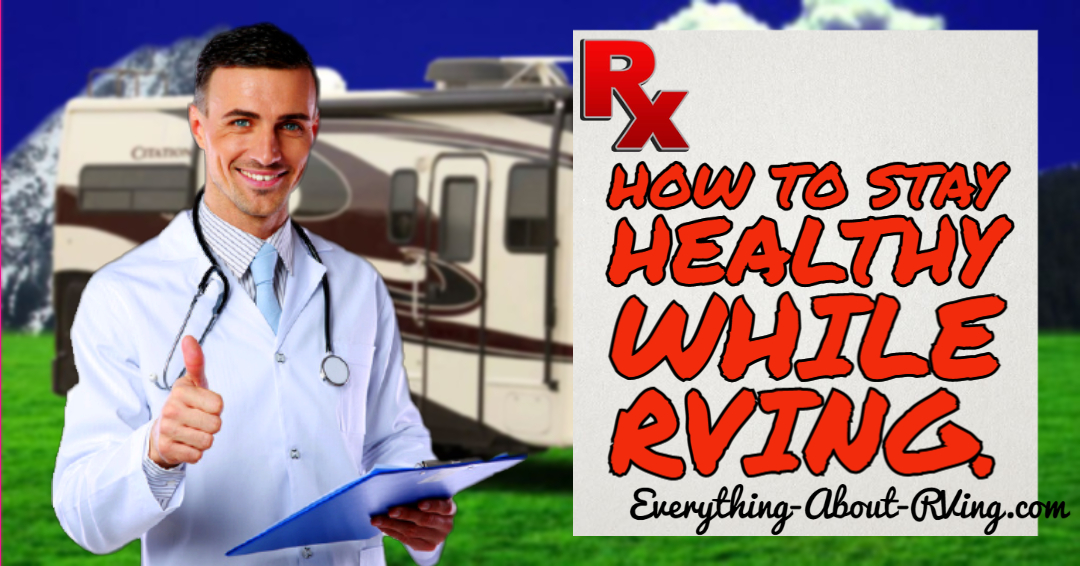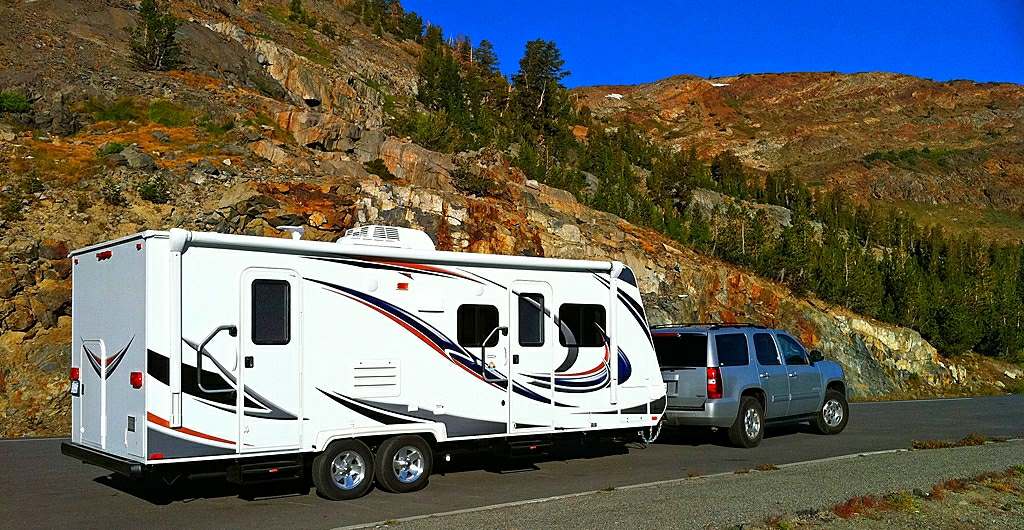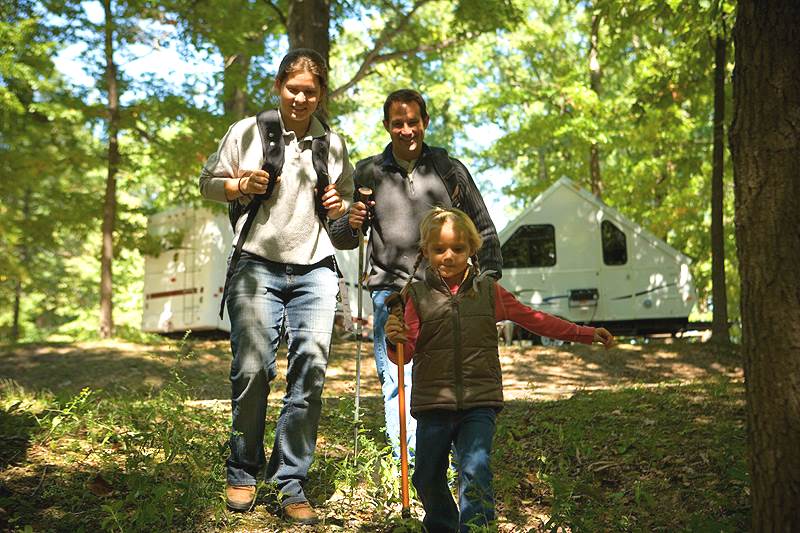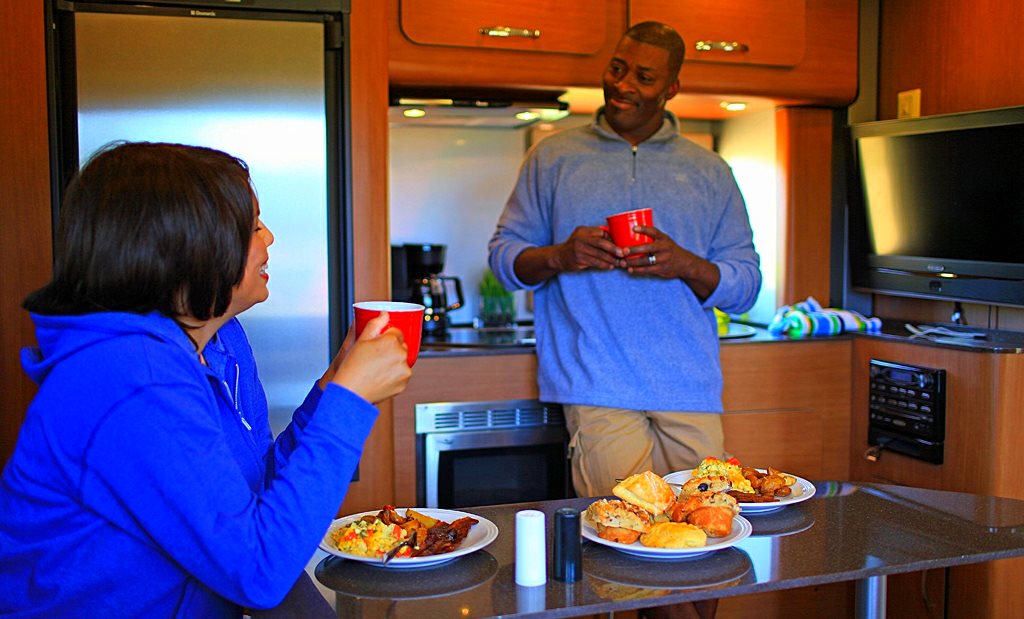- Home Page
- RVing Tips & Tricks
- Healthy
Staying Healthy While RVing
By Bill Revill
"There seems little doubt that, to be truly independent, staying healthy must be your first priority"
It's no secret amongst experienced RV travelers: self-reliance saves money. The more independent you are of tourist parks, power hook-ups and all those other so-called necessities, the further your budget will stretch. And the greater will be your freedom.
In fact serious RV nomads find real challenge in living comfortably on remote campsites, and in replenishing resources along the way. But no matter how successful we may be in this quest, there's one universal factor that can destroy our plans and negate all our skills in one cruel blow: Poor health. In just a day or two, years of experience could be all but wiped out.
There seems little doubt that, to be truly independent, good health must be our first priority. Without it, all else is wasted.
OK. So what's the good news?
Well, the best thing about health is that it's pretty much a do-it-yourself program. You have, within yourself, considerable power to make a significant impact. Believe it or not, for the majority of us, that means we require little or no help from the medical and pharmaceutical fraternities!
Of course, any comprehensive D.I.Y. health program comprises a range of inter-dependent activities, but while on the road there are three key elements that RV travelers ought to consider:
Protection (against physical and biological threat)
Exercise
Diet
PROTECTION
Even the healthiest people in the world have a fundamental need to protect themselves. After all, countless simple hazards have the potential to put us "out of action", and mobile, outdoor lifestyles certainly present those sorts of threats.
For example, motoring hazards confront us in several forms. There's the ever-present risk of mechanical failure -- such as brakes or steering -- that could result in personal injury. Even seemingly minor problems like a leaking exhaust system can become a major threat under certain circumstances.
The solution rests largely in keeping vehicle, caravan, motorhome or whatever in the best condition possible. Regular servicing, along with daily inspections, almost guarantee that mechanical problems won't arise unexpectedly.
Driving conditions are another risk. Heavy traffic, narrow mountain roads, and high wind present a range of tricky situations. Again, the risk can be minimized simply by taking extra care.
Slow down, fasten your seat belt, and stay alert and you can feel assured that, apart from an occasional adrenalin surge, everything will be all right.
The other area where we may need protection is in countering a variety of potential biological attacks. Impure water, for instance, can very quickly ruin your day -- perhaps a whole week! When in doubt, boil drinking and cooking water vigorously for at least three minutes.
Contaminated or spoiled foods may have a similar effect, so strict hygiene and careful refrigeration are even more critical than back home in suburbia. You also need to be extremely thorough when disposing of kitchen and toilet waste. Here in Australia, our reputation for hordes of over-friendly flies is indicative of a more serious potential threat to our health.
Other insects, too, can be a problem. Mosquitoes, spiders, wasps, ants and scorpions are just a few of the common nasties across the country, so travelers should prepare accordingly with screening, repellents and appropriate clothing.
In essence, protection boils down to this: BE CAREFUL. Don't take risks, and apply a generous dollop of common sense.
EXERCISING TO STAY HEALTHY
Even when traveling, it's a good idea to maintain a healthy and reasonable exercise program. But there is a catch: To avoid costly courts or gyms, or the added weight of exercise equipment, the range of suitable activities while living on the road is severely limited.
Fortunately, the best exercise of all is walking. It's free, requires only sturdy, comfortable footwear, and can be enjoyed anywhere.
Even so, the real benefits of walking are its gradual, but certain and significant effects on your health. It helps lower blood pressure, reduces body weight, and develops efficient heart and lung functions. All of which are free!
Not only that, you can build a healthy walking program slowly over several months from, say, a 15 minute stroll to a 45 minute vigorous walk. Do that four or five times each week and you'll soon be getting about all the exercise you need. Before long, you'll feel great, look good and sleep better. And you'll have fun doing it.
HEALTHY DIET
For optimum health on the road we need to take a holistic view of diet. By my definition, then, diet is the sum total of everything taken into the body -- usually via the mouth.
The greatest favor we can do for ourselves is to take control over this daily process. Even years of abuse can be reversed if you make a firm commitment to improve your selection and quantity of healthy foods, drink and other substances.
Worst intake of all is cigarette smoke. Maybe it's not always possible to avoid other people's expired smoke, but if it's you doing the smoking, you certainly can take charge. For your health, your finances, and your traveling independence, if you smoke, make a determined effort to stop.
Another common substance is alcohol. Although it's not up in the same danger zone as nicotine, your body benefits enormously if you limit the intake of alcoholic drinks.
But don't get me wrong here. A glass or two of beer or wine are very enjoyable, and in limited quantity alcohol is now believed to be beneficial in helping us to relax. It's those long, hard drinking sessions, repeated frequently over many years that eventually take their toll.
So it's wise to try to limit alcohol intake by, firstly, substituting a glass of water for every second or third alcoholic drink, and secondly, making a few days each week completely alcohol free. Your body soon rids itself of toxin build up, allowing vital organs to resume their job.
With regard to food intake, as far as possible build your meals around healthy fresh fruit and vegetables. When these aren't available, canned or dried substitutes provide equivalent nutrition. Other high value foods include breads -- particularly wholegrain -- cereals, pasta and rice.
At the same time, try to limit your consumption of salt, sugar, oils and fats, desserts and sweets, cakes, butter, fast foods, and full-fat dairy products. Even eggs and fatty meats should be eaten in moderation. Not only does health improve, you also stand to save a bundle.
Finally, if you're more than 10 percent overweight, gradually cut back on the groceries.
Sounds easy doesn't it? But you know as well as I do that nothing worthwhile is ever easy. Initially, like any change in lifestyle, effort and discipline are necessary.
Nevertheless, the really good news about a healthy lifestyle is, the increased freedom and independence will definitely make it all worthwhile.
About The Author
Bill Revill is an Australian freelance writer, fulltime RV traveler, and remote lifestyle expert. For further information go to: http://www.authorsden.com/billrevill
Copyright 2007 by W.V. Revill
Return to the RV Lifestyle Articles page from the RV Travels: How To Stay Healthy On The Road page







